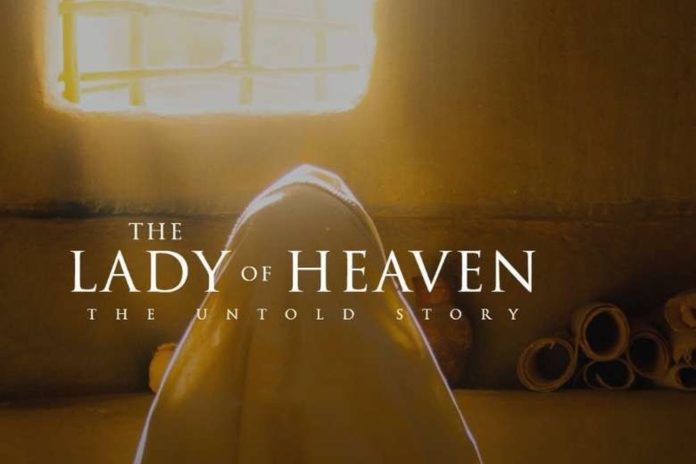Roshan Muhammed Salih reviews Lady of Heaven, the sectarian hate film that is being platformed by cinemas in the UK and could provoke serious Sunni-Shia tensions.
There is no doubt that Lady of Heaven is going to create sectarian tensions between Sunnis and Shias in the UK once it becomes widely available here.
Its trailer, released over a year ago, has already received over three million views and gave us a glimpse into the sectarian narratives that would follow.
The actual film itself has been released in the United States, Canada and Ireland and will surely hit cinemas here soon as well as prominent streaming services. After all, the film’s mysterious financial backers will have to recoup their $15 million budget somehow.
In short, the worst fears of Sunnis will be more than realised. Lady of Heaven is two hours plus of the most extreme Shia sectarian narratives about how the caliphate was supposedly “usurped” from the Ahl ul Bayt. And most Muslims will find the invective against three of the most beloved companions of the Prophet Muhammad (pbuh) shocking and disgusting.
But it is also a deeply racist film with all the main negative characters being portrayed by black actors. What’s more, the film directly disrespects the Prophet (pbuh) by showing his face.
That said, given that the scriptwriter was the notorious hate preacher Yasser Al-Habib no one should be really surprised.
Subscribe to our newsletter and stay updated on the latest news and updates from around the Muslim world!
ISIS
The opening credits of the film state that it “supports the ideal of a peaceful world living in harmony.” It then promises that in accordance with Islamic tradition no individual will represent a “holy personality.”
On both counts, as I shall explain, the film broke its pledges.
But first things first. The movie opens in Mosul, Iraq, in 2014 when ISIS take over the city with their usual brutality. Soon after an ISIS fighter comes across a young Shia boy, Laith, who he plans to teach a lesson. Later, he and his comrades break into Laith’s mother’s flat and execute her for belonging to her sect. Laith’s mothers name is Fatima.
If you haven’t figured it out by now this scene is meant to be a modern day re-enactment of an incident that Sunnis (like myself) believe never actually happened – the fabricated story of how two of the Prophet’s closet companions supposedly were responsible for an assault on his beloved daughter Fatima (ra). Audhubillah.
And of course the whole ISIS analogy is meant to compare three of the Prophet’s closest companions to this 21st century terrorist group.
The rest of the story alternates between the two eras – modern day Iraq and 7th century Arabia. Laith finds a new home where an elderly lady tells him the story of the Prophet’s daughter Fatima (ra), with parallels continually being drawn between the extremism and bloodthirstiness of ISIS and the Prophet’s companions (ra).
The Prophet’s family
The positive characters in the film are obviously the Prophet (pbuh), Fatima (ra) and Ali (ra); and of course there is nothing wrong with that. These are characters whose righteousness is universally agreed upon by Muslims.
However, Muslims will find the fact that the Prophet (pbuh) is depicted by an actor (or by CGI) – and yes we can see his face clearly – deeply shocking and disrespectful to the best of creation.
The Prophet (pbuh) is depicted throughout the film as favouring his family over others and there is a scene at Ghadeer Khum where he is clearly seen designating Ali (ra) as his successor (Sunnis obviously reject this version).

Ali (ra) is probably the film’s main character and is depicted as a brave warrior (undoubtedly true) and someone of the highest moral calibre (also true). But he is also portrayed as doing nothing as his wife is assaulted (obviously untrue) and of allowing himself to be led away in chains by his political rivals (also obviously untrue).
Meanwhile, Fatima is correctly depicted as having the highest moral character but is falsely portrayed as having real animosity towards two of the Prophet’s closest male companions (rather than disagreeing with them over certain issues).
I must say here that while no-one denies that there were certain tensions between these great Islamic personalities, the consensus among the vast majority of Muslims is that they all loved and respected each other notwithstanding some political disagreements.
The Sahaba
Unfortunately every Sunni Muslim will know who the supposed “baddies” are in the film.
The two immediate successors to the Prophet are disgustingly portrayed as scheming and wicked and worse (audhubillah).
They are depicted as deliberately going against the Prophet’s orders in order to seek political power and wealth and using whatever brutality they can to secure their aims. The pair are also seen rejecting Ali’s “version” of the Quran.
The Prophet’s immediate successor is also depicted as planning to assassinate him (may Allah forgive me for writing these words).

The pair are played by black actors while they were clearly historically Quraishi Arabs. Of course there is nothing wrong with black people acting in any film but there seems to be a whiff of racism in portraying the three main “negative” characters in the film as black people. The actor who plays the second caliph is also portrayed as ugly through the use of make-up.
And yes you guessed it, the Prophet’s third wife is played by a black actress too and she is depicted as having a short temper, having schemed to secure her father the caliphate, and having (audhubillah) poisoned the Prophet (pbuh).
All absolute nonsense of course. These three amazing human beings were all loved and respected by the Prophet (pbuh) and played a vital role in the preservation and dissemination of Islam. We all owe them a huge debt and may Allah SWT grant them all the highest of rewards.
The house of Ali and Fatima
The scene in the movie that will undoubtedly cause the most outrage among Muslims is the fabricated episode of the door.
In a nutshell, the fabricated version in the film runs like this: The first calpih gives the order to use whatever means necessary to force Ali (ra) to pledge allegiance to him. The second caliph then carries out this order by burning his house down while Fatima (ra) is at the door.
Once the second caliph gains entry into the house he beats and whips the Prophet’s daughter as well as making sure she is stabbed by a nail. This ultimately leads to her losing her unborn baby (according to the fabrication).
After fighting with the second caliph, Ali (ra) is then led away in chains to be forced to pledge allegiance to Abu Bakr (ra).
Please be aware that all mainstream Sunni scholars reject this story as a complete lie.
Does the film represent all Shias?
From a production perspective it’s obvious that a lot of money has been spent on Lady of Heaven and this is especially reflected in the cinematography. Non-Muslim viewers may find the film engaging too which makes it even more dangerous.
As for Muslims, it is bound to cause a firestorm if it is widely disseminated in the UK. For this reason alone we should give some thought to petitioning platforms not to carry it.
Also in the interests of fairness, I must say that when the trailer was released last year several Shia groups in Iran, Pakistan and the UK did condemn the film.
For example, some Shia scholars in the UK said: “We wish to inform all our community members that any attempt which causes friction and disunity amongst Muslims is against the teachings of Ahlubayt and not in line with the Fatwas of our honourable Ulama and Religious Authorities (Maraji’).
“We therefore wish to inform all Muslims that any scenes depicting revered figures of other Muslim schools of thought which may cause sectarian tensions most definitely does not represent the true Shia Islam and its followers.”
So let me say this clearly – I’m not trying to say that this film represents all Shias. While I’m sure that some Shias wholeheartedly support it, I know others do not believe in provoking Sunnis despite believing in the events described in the film. On the other hand, I also know that some Shias may well disagree with some of the details in the film.
Moreover, Yasser Al-Habib is considered a marginal figure among mainstream Shias due to his blatant provocations against some of the best people in history.
That said, I do think that when it is released in the UK the Shia community needs to again distance itself from the film if they are really interested in communal harmony. Cursing the Sahaba is a red line for Sunnis and we will always be ready to defend their honour.
Therefore, for the sake of any meaningful unity, collaboration and co-existence, Shia groups must not stay silent.



















